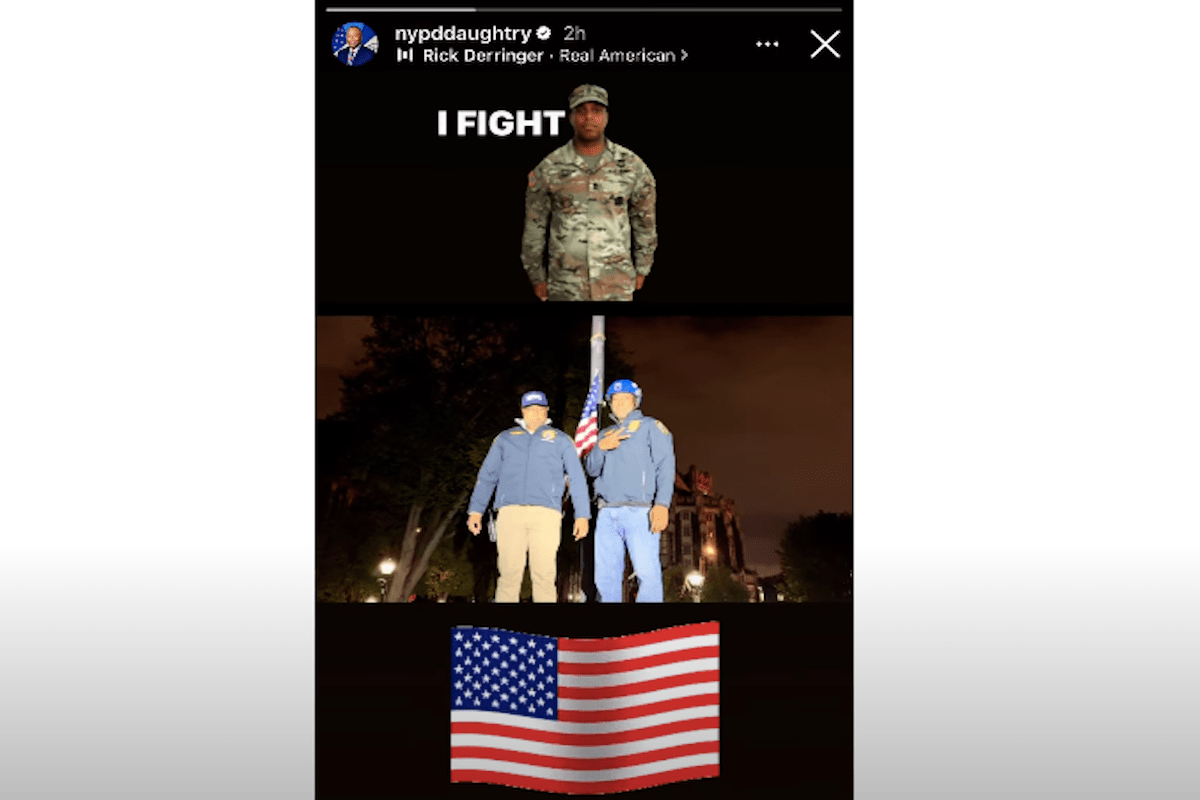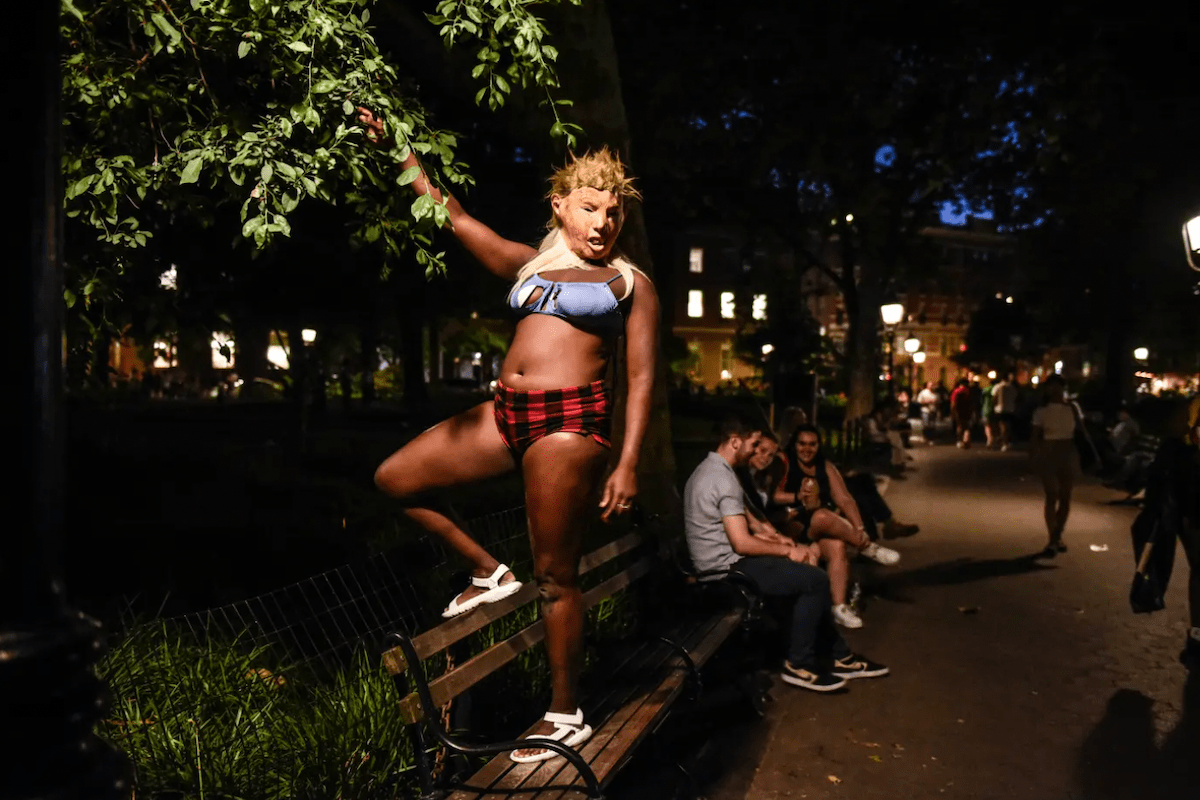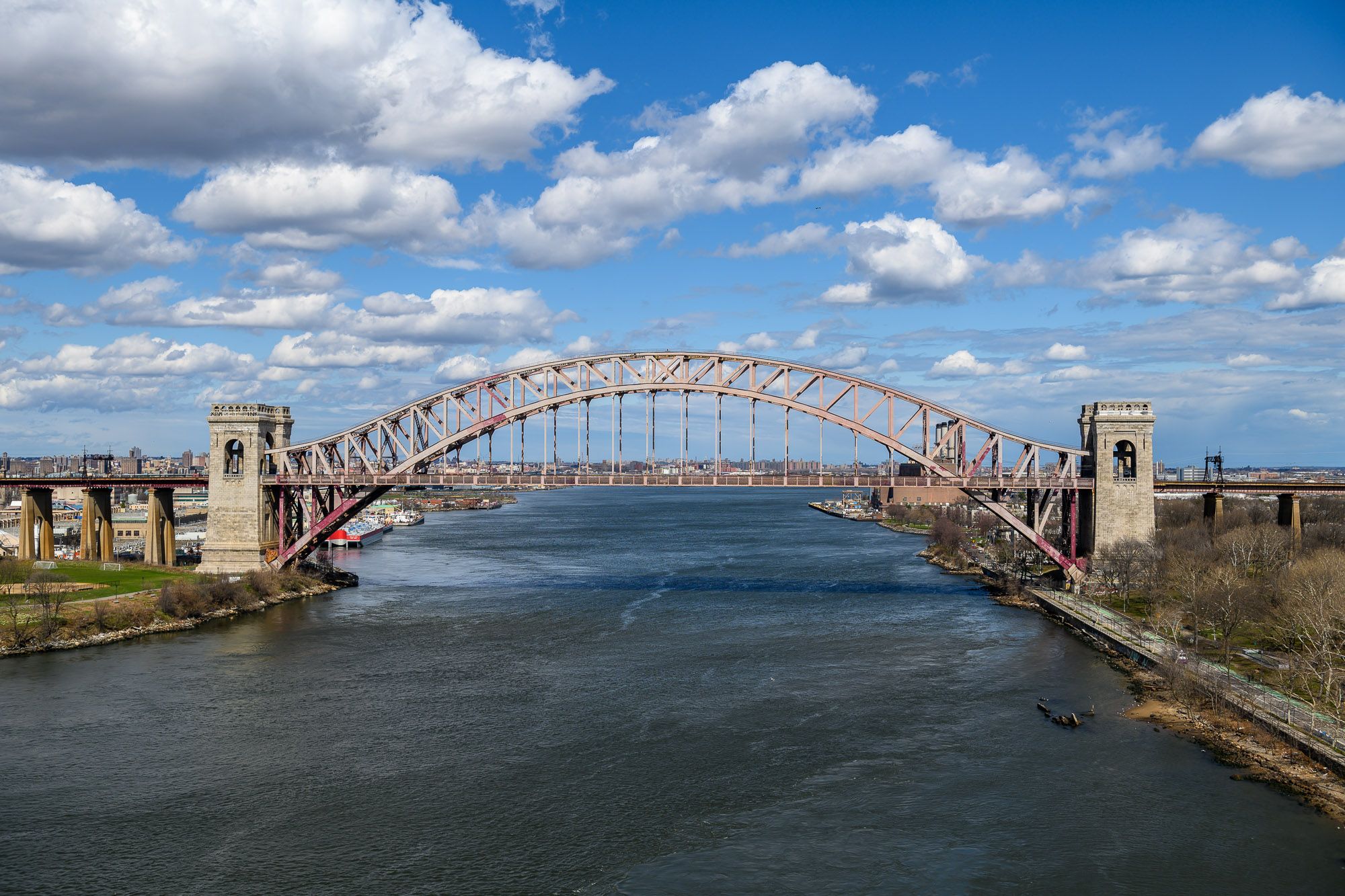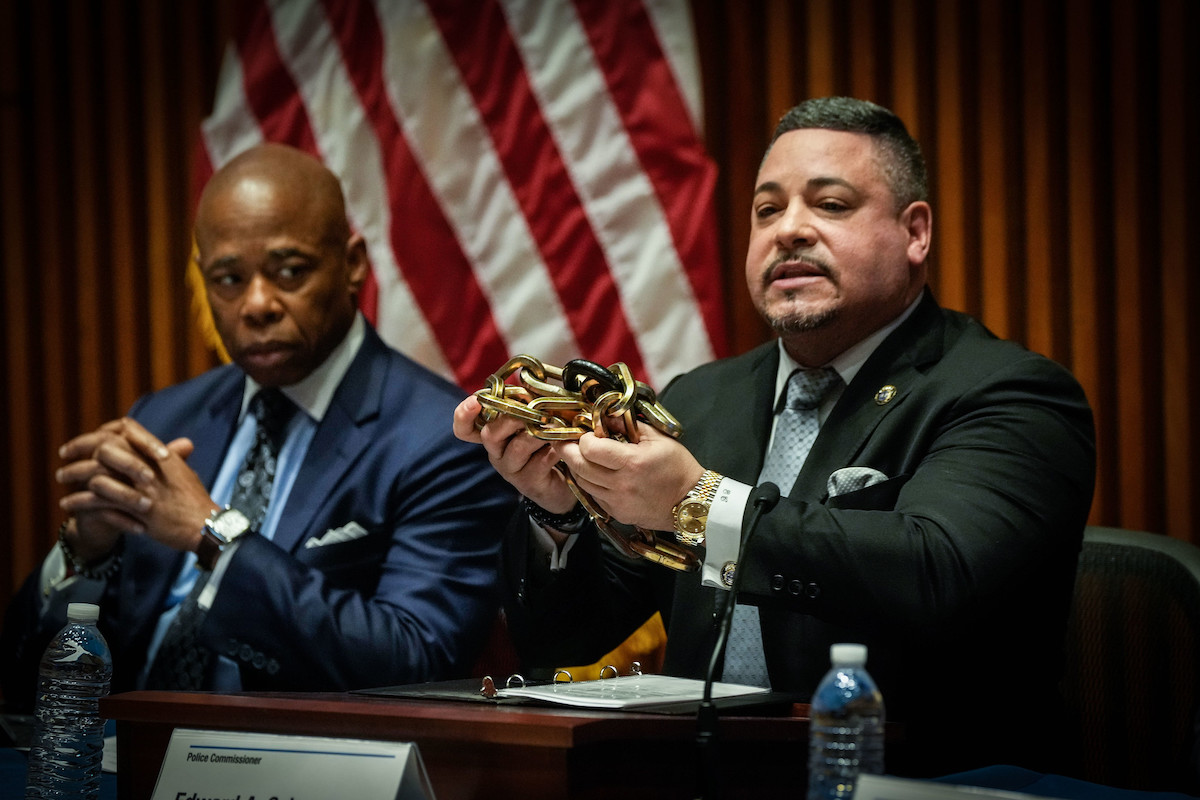Adams Fought the Lawmakers and the Lawmakers Won
City Council voted Tuesday to override the Mayor’s veto of bills on police transparency and humane jail conditions
4:20 PM EST on January 31, 2024

Public Advocate Jumaane Williams and Council Speaker Adrienne Adams before the vote on Tuesday. (John McCarten/NYC Council)
On Tuesday morning, City Hall was abuzz, as the biggest political conflict of the new year came to a head. City Council had scheduled a vote to override two bills vetoed by Mayor Eric Adams. One bill required City jails to end the practice of holding people in protracted isolation. (The council had already banned solitary confinement nearly a decade earlier, but studies suggested that the Department of Correction has simply continued the practice under other names.) The other bill, prompted by evidence that police officers are routinely miscategorizing their encounters with the public in a way that obscures who they're stopping, how often, and why, requires the police to log all of their encounters, not just those required under the consent decree governing the department's stop-and-frisk practices.
Adams had vetoed both bills, arguing that asking police to log their encounters would drown them in paperwork and make the public less safe, and that restricting the jails' ability to isolate people in custody would make the jails less safe. After the vetoes, the mayor undertook a weeks-long high-profile campaign of speeches, press appearances, photo-ops, and animated shorts to try to prevent his vetoes from being overridden. The Council, for its part, which has generally steered away from direct legislative conflict with the mayor, appeared determined to follow through on its override.
The building swarmed with public officials, staff, organizers, and press. Before the vote, scheduled for 1:30, the mayor would give his weekly 11 a.m. press conference, giving reporters a chance to ask him what was going on. Why was the mayor was leaning so hard into preventing a veto override, expending more time, energy, and political capital than he has on most other initiatives, especially when it seemed clear he was going to lose? The hard work of building veto-proof support for the bills had already been done months ago, and the council was confident that they still had more than enough votes for an override, so why exactly was the mayor tilting so hard at this windmill?
Speculation on the mayor's motivations among the press, activists, and City Hall staffers abounded. It was disorganization, some said: The mayor's aides didn't get their act together in time to influence the bills the first time around, and now they wanted another crack at it. It was electioneering, others hypothesized: By making a political drama around the bills now, maybe the mayor hoped to be able to blame any public-safety backsliding in the future on the council. Or all this noise was just a way for Adams to once again present himself to the public as the law-and-order guy, on the barricades against a tide of impractical woke idealists with no idea what public safety actually requires.
In the Blue Room, as reporters waited for the mayor to make his entrance, some tech guys fiddled with a large TV screen's HDMI settings, suggesting the press conference would include a video presentation. Sure enough, after the mayor and his staff entered to his usual processional of "Empire State of Mind," he cued a slickly produced video, set to stock music with a propulsive beat, of the NYPD ride-along he had hosted last weekend for a small group of councilmembers, an event intended to persuade the council that police work is simply too fast-paced and high-stakes for cops to be expected to log their interactions with the public.
"In policing, seconds are the difference between life and death," the mayor gravely intoned.
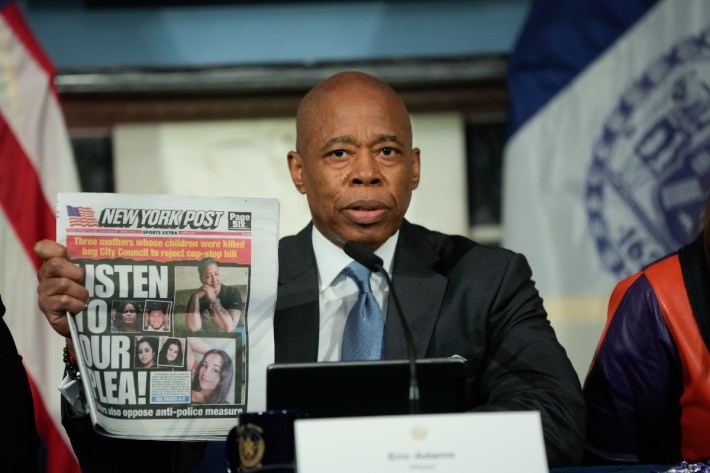
Why hadn't the mayor cut a mutually acceptable deal with council rather than staging this high-profile showdown he was evidently about to lose, reporters wanted to know. Was he planning on running on this showdown with the council?
"This is not about reelection, this is about protection," Adams insisted. "I don't want innocent people harmed in this city."
Afterwards in Room 9, the cramped office where the press maintains a beachhead inside City Hall, reporters compared notes and rolled their eyes—at the mayor for his theatrical press conferences, at the City Council for a characteristically chaotic and much-delayed vote, now scheduled for 1:30. Someone had bought a panettone to share. Word came through that City Council Speaker Adrienne Adams and Public Advocate Jumaane Williams, the main proponents of the two bills, were already in the process of giving their own press conference down the hallway. "Jesus, and they couldn't bother to let us know?" one reporter grumbled as everyone tumbled out to join the presser.
Addressing a full house at that presser, Speaker Adams displayed a poise and a calm confidence that made the mayor's earlier appearance seem churlish by comparison. Asked if the override constituted a power struggle with the mayor, she answered evenly: "This isn't about any kind of power struggle," she said. "We are legitimately co-equal partners and co-equal workers within this building."
The protestations of the NYPD and the mayor that the reporting bill would bury officers in paperwork doesn't make sense, Adams said. "The NYPD is the most technologically savvy police department on the planet," she said. "We have a digital dog that goes into buildings to protect the NYPD and civilians where there is perceived harm in a building. What we have asked for in this simple data-recording bill is for an upgrade to a smartphone [app] that for all intents and purposes the force is already using." Recording demographic information will take seconds, she said, and will only be required for investigative encounters, not the broad swath of routine conversations the mayor and NYPD leaders have suggested.
"The resistance to this legislation is disturbing," Speaker Adams said. "There should not be resistance to finding out the facts of who is being stopped and why."
1:30 came and went without the council vote. Finally, more than an hour late, councilmembers packed into the floor of the upstairs council chamber to vote. In the balcony, the public seats were filled with organizers from Communities United for Police Reform, the Jails Action Coalition, and others who had worked for years to get to this moment. In between and amongst them, identified by discreet pins on their suit jacket lapels, sat members of the Correction Officers Benevolent Association, the Rikers guards' union that bitterly opposed the bill banning solitary confinement.
Roll was finally called, allegiance to the flag was pledged, and Speaker Adams addressed the chamber: "Both bills were passed by this body with a veto-proof majority because we believe that all New Yorkers deserve transparency and safety," she said.
And then: delay. Councilmember Kalman Yeger, a member of the Democratic majority but an outlier on the party's police union-endorsed, Palestine-erasing right wing, attempted to halt the proceedings entirely, arguing that the council had not properly posted an agenda for the meeting in advance as required by the City Charter.
Some in the balcony began to get restive. "No wonder we don't get anything done in this government," someone muttered. Others urged patience. "They gotta follow the, what is it, the Robert's Rules of Order," someone advised.
Yeger's last-minute salvo failed, and finally, the roll-call that matters began. "Are we voting for real now?" Councilmember Shaun Abreu asked when his name was called. Most of the councilmembers, not content to merely vote, asked permission to make small speeches as well. "Both of these things equate to less safety," Councilmember Joann Ariola says, before voting no. "This is going to tie the hands of police officers," said the conservative Democrat Bob Holden, a no vote, adding darkly, "which is the intent here."
Councilmember Vickie Paladino cast the vote as unjustified racial grievance. "Please don't make this a racial thing, it's not," she said, before stating, "I don't like to profile, but there are a certain amount of things that are happening here today that doesn't involve transparency at all, it's just about color."
That statement didn't sit well with some of her colleagues. "I'm just gonna make this really clear: We didn't make this a race thing. This is a race thing," Councilmember Kevin Riley responded. "I got thrown into a holding cell because I was Black on the Upper West Side looking for parking, and they thought I was casing houses. This is something that we deal with on a daily basis."
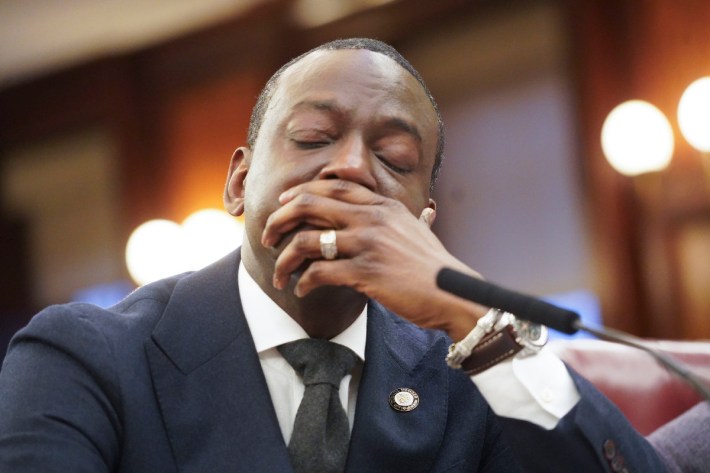
Councilmember Yusuf Salaam, who served nearly seven years in prison before being exonerated, and whose traffic stop by the NYPD the weekend before became further fodder for the debate over the mayor's vetoes, spoke with emotion. "Today, the New York City Council is fighting for the implementation of two bills that would bring generational change in our criminal justice system," he said. "If these laws were in place in 1989…" He trailed off, overcome. He leaned back in his chair, and knocked softly on his desk, before finally collecting himself. "I vote aye," he said.
The final tally was 42 to nine in favor of overturning both of the mayor's vetoes. On the floor and in the gallery, cheers erupted. Speaker Adams embraced Salaam. Spilling into the hallway, councilmembers gave jubilant interviews to TV cameras, as stony-faced men from the jail guards' union tried to get in the shot behind them holding signs that read "Correction Officers Are Being Sexually Assaulted."
The celebration spilled down the curving stone stairway under the dome. Organizers and councilmembers who had championed the bills posed for photographs, fists raised. "No more solitary confinement!" someone chanted.
The crowd broke up, with some discussing where to continue their celebration. Reporters retreated to Room 9 to file their stories.
Thanks for reading!
Give us your email address to keep reading two more articles for free
See all subscription optionsNick Pinto served two tours as staff writer at the Village Voice. His reporting has appeared in The New York Times Magazine, Gothamist, The New Republic, Rolling Stone, The Intercept, and elsewhere.
Stay in touch
Sign up for our free newsletter
More from Hell Gate
We Can’t Afford Public Libraries But Check Out This Sick NYPD Media Production Celebrating the American Flag
The mayor and his police brass are obsessed with a piece of jingoistic propaganda they staged after arresting a bunch of college kids. They’re right to be, it’s awesome.
Crackhead Barney Wants to See You at a Protest
Just don’t ask New York City’s foremost living performance artist why she does what she does.
Burmese Bites Brings Their Big, Funky Flavors to Midtown
"My motto is: Burmese food should be known throughout the world."
The ‘Outside Agitator’ Narrative Is Getting Pretty Messy
These tidbits raise more questions than they answer.
